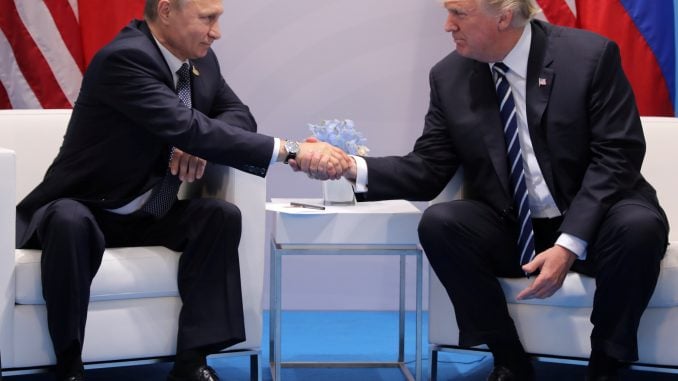
HAMBURG, GERMANY — U.S. President Donald Trump came face-to-face with Russian President Vladimir Putin on Friday at the G20 summit in Germany, marking one of the most eagerly anticipated meetings between two world leaders in years. Hours later, U.S. Secretary of State Rex Tillerson announced that the two countries, along with Jordan, had reached a landmark ceasefire deal in the war-torn country of Syria.
Trump said that it was an “honor” to meet Putin for the first time and that he looked forward to “positive things” in the relationship between the former Cold War rivals, while Putin said he was “delighted” to meet Trump personally.
The meeting, which lasted more than two hours, marks a milestone since the U.S. intelligence community linked Russia to cyber interference in the 2016 presidential election. Moscow has denied any involvement, and former FBI Director James Comey has said that there is no evidence of collusion between the Trump campaign and Russia.
Trump and Putin spoke through translators with their respective foreign ministers present for six minutes before reporters were allowed into the room for their statements. Afterwards the reporters were ushered out and the meeting continued.
“President Putin and I have been discussing various things, and I think it’s going very well,” Trump told reporters, sitting alongside the Russian leader. “We’ve had some very, very good talks. We’re going to have a talk now and obviously that will continue. We look forward to a lot of very positive things happening for Russia, for the United States and for everybody concerned. And it’s an honor to be with you.”
Putin, through a translator, said: “We spoke over the phone with you several times,” adding: “A phone conversation is never enough.”
“I am delighted to be able to meet you personally, Mr. President,” he said, noting that he hoped the meeting would yield results. Trump listened intently as Putin spoke.

After the meeting concluded, Putin told Russian reporters that he discussed Ukraine, Syria, terrorism and cyber-security with his U.S. counterpart.
“We had a very lengthy conversation,” Putin said after the extended session, and apologized for turning up late to his next meeting with Japanese Prime Minister Shinzo Abe.
Before the meeting, some feared that Trump, a political novice whose team is still developing its Russia policy, would be less prepared for the talks than Putin, a former KGB agent who has dealt with the last two U.S. presidents and scores of other world leaders.
Amid criticism of Russia’s actions in Ukraine and Syria and the investigations into its role in the U.S. campaign, Trump has come under growing pressure to take a hard line against the Kremlin.
A day before his meeting with Putin, Trump delivered some of his sharpest remarks about Moscow since becoming president, urging Russia to stop its “destabilizing activities” and end its support for Syria and Iran.

But the president stopped short of any personal criticism of Putin and declined to say definitively whether he believed U.S. intelligence officials’ assertion that Russia had interfered in the 2016 U.S. election.
“I think it was Russia but I think it was probably other people and/or countries, and I see nothing wrong with that statement. Nobody really knows. Nobody really knows for sure,” Trump said on a visit to Poland on Thursday.
CEASEFIRE IN SYRIA
Hours after the meeting, U.S. Secretary of State Rex Tillerson said that the United States, Russia and Jordan reached a ceasefire deal in southwestern Syria, one of the combat zones in a bloody six-year civil war.
Tillerson was present at the meeting in Hamburg between Trump and Putin, along with Russian Foreign Minister Sergei Lavrov.

“I think this is our first indication of the U.S. and Russia being able to work together in Syria, and as a result of that we had a very lengthy discussion regarding other areas in Syria that we can continue to work together on to de-escalate the areas,” Tillerson said.
Tillerson, the top U.S. diplomat, had said before going to Hamburg that the United States was prepared to discuss joint efforts with Russia to stabilize Syria, including no-fly zones, ceasefire observers and coordinated deliveries of humanitarian assistance.
The ceasefire will go into effect on Sunday, and Tillerson said the area covered by the ceasefire affects Jordan’s security and is a “very complicated part of the Syrian battlefield.”

“It is (a) well defined agreement on who will secure this area,” he told reporters Friday afternoon.
Russia and Iran are the main international backers of Syrian President Bashar al-Assad while Washington supports some of the rebel groups fighting for his ouster.
The Syrian conflict has killed nearly half a million people, according to the Britain-based Syrian Observatory for Human Rights, and forced millions of others to flee the country.
The United States and Russia held secret talks on creating a “de-escalation zone” in southern Syria, Western diplomats and regional officials said in early June.
The proposed zone was in Deraa province, on the border with Jordan, and Quneitra, which borders the Israeli-occupied Golan Heights, they said. Backed by Russian air power, Assad has regained ground in the last year that he lost to the mostly Sunni Muslim rebels earlier in the conflict.
The Syrian army has in recent months escalated its strikes in the southwestern city of Deraa in a campaign to reach the border with Jordan and wrest full control of the city.
The army said on Monday it would suspend combat operations in southern Syria, but rebels said the military had violated the ceasefire by striking areas under their control.
Roberta Rampton, Jeff Mason, Yara Bayoumy and Alistair Bell from Reuters News Service contributed to this article, with additional reporting by Patricia Zengerle, Susan Heavey and Doina Chiacu in Washington; Denis Pinchuk in Moscow and Denis Dyomkin in Hamburg.



